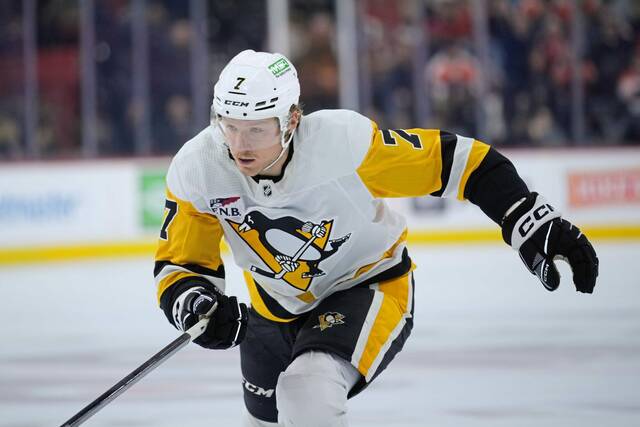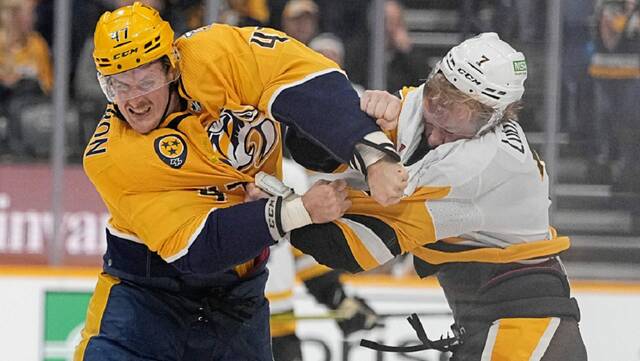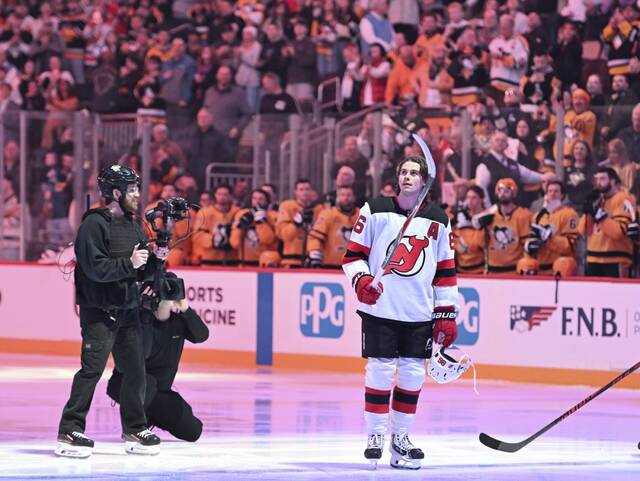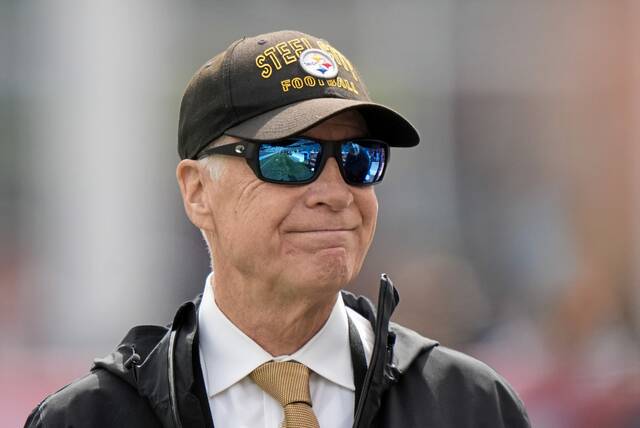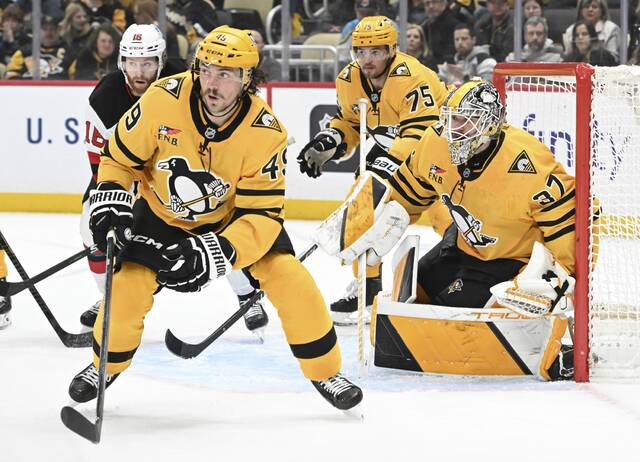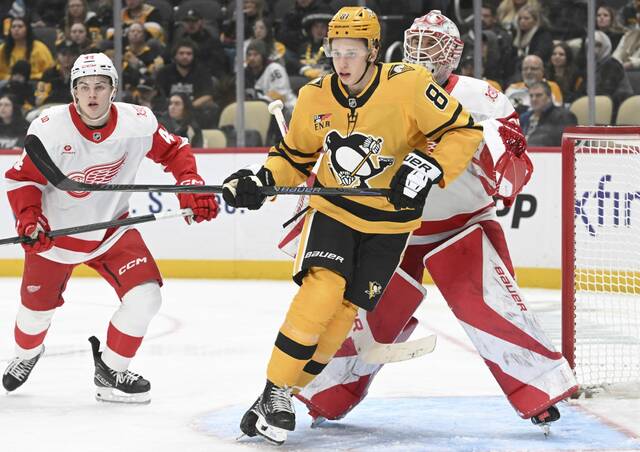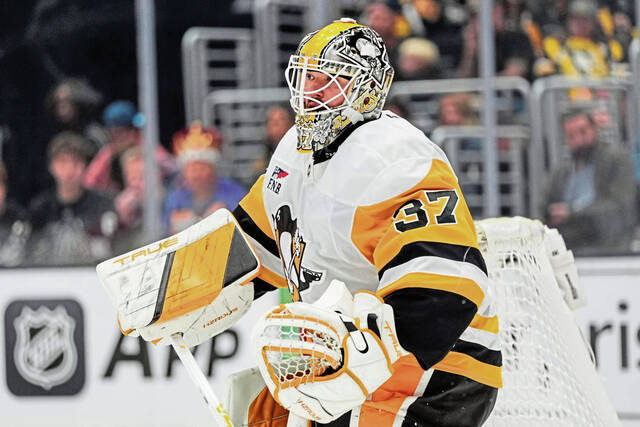It really isn’t difficult to understand where Pittsburgh Penguins rookie defenseman John Ludvig gets his toughness. He is his father’s son.
In this case, the father is former NHL forward Jan Ludvig.
And the pronunciation of his first name perfectly illustrates the resilience Jan learned as a teenager and then passed on to his five children.
Is it “Yahn,” as is typical for European men? Or “Jan,” like the shortened version of the female name Janet?
A native of the former Czechoslovakia, Jan Ludvig was given a blunt lesson on nomenclature as a teenager when he played for the Kamloops Junior Oilers in British Columbia during the early 1980s.
“You have a girl’s name, Jan!” Ludvig recalled hearing from rival fans one night.
That prompted him to tell teammate Dean Evason, a future NHL player and coach, about the slight.
Evason’s response?
“Yup.”
Much like Johnny Cash’s alter ego “Sue,” Jan Ludvig — who indicated no preference as to the proper pronunciation — learned he had to get tough to make it in North American hockey.
His grit allowed him to carve out seven seasons in the NHL as a feisty forward who fought all challengers despite being a compact 5-foot-8 and 194 pounds. Per Hockey Fights, Ludvig had 28 fights, including several against some legitimate ruffians like Mike Milbury and Scott Stevens.
Fighting was common in the 1980s but not for Europeans, especially for those with limited dimensions.
“I would not consider myself a tough guy,” Jan Ludvig said by phone. “I just tried to fight my own battles. The reason I did that — people often ask me why as a small guy in a big man’s game, and I was European — I wanted respect. I heard (Canadian commentator) Don Cherry one time saying on TV that ‘these Europeans, they’re dirty, they never fight their own battles.’ It kind of stuck with me.
“I tried to just live by my actions.”
Like father, like son
The apple didn’t fall far from the tree, though the apple did have a rough fall in his first NHL game.
Making his debut Oct. 24, John Ludvig lined up Dallas Stars forward Radek Faksa in the neutral zone during the second period of a 4-1 home loss at PPG Paints Arena. And he made contact in a major way.
The collision was so violent, Ludvig struck his face off of Faksa’s helmet and suffered a concussion, causing him to miss the next 11 games.
“I’ve always played like that,” John Ludvig said. “Things exactly like that have happened to me before. I know if I play that way, a little bit on the edge, things like that are going to happen. I’m fine with that. It’s not going to change how I play.”
Jan Ludvig, coach of the Kamloops Storm in the Kootenay International Junior Hockey League, saw the mishap from across the continent.
“It’s just part of his journey,” the 62-year-old said of his 23-year-old son. “Basically, a part of his game is putting his butt on the line every night. Sometimes you’re the hero, and sometimes things go sideways. They don’t work out the way you dreamt and planned it. But it’s all good. It’s what your response is. You either buckle and crumble and say this is too hard. Or you analyze and learn or try to get to better.”
For the most part, John Ludvig’s game has progressed in the right direction since then.
A regular presence in the lineup for the past nine games, Ludvig has one assist and has offered the physical element that Penguins management found appealing when he was claimed off waivers from the Florida Panthers on Oct. 9.
In addition to recording his first assist during a 3-2 overtime road loss to the Nashville Predators on Nov. 28, Ludvig (6-foot-1, 213 pounds) registered his first fighting major as an NHLer when he tussled with massive forward Michael McCarron (6-foot-6, 232).
“I made sure he was exposed to everything that gets you respect in North American hockey,” Jan Ludvig said. “He’s been boxing since he was 10 years old. Him and his sister, they wrestled. They were in a wrestling club. … The stuff I noticed you get respect from your teammates and your management and your coaches is if you’re willing to stand up for your teammates. And Johnny is fiercely protective of his teammates and his team.
“That’s what the Western Hockey League taught both of us.”
Western culture
Living in Western Canada taught Jan Ludvig much when he defected from Czechoslovakia in 1981.
“That’s about a 10-beer story, and it gets better with every beer,” quipped Jan Ludvig, a native of the city of Liberec. “Back then, the only way to come here was to emigrate and sneak out. I snuck out through Yugoslavia, which was the only country you could kind of sneak through from the Eastern Bloc.
“I spent time in a refugee camp in Austria. I had some relatives in Edmonton, and I told them that I played hockey. They didn’t really know much about hockey, but I asked them if they could get in touch with the Edmonton Oilers and their former (general manager) Glen Sather. They offered me an amateur tryout if I signed with them.
“They got me out of the refugee camp and paid for the airline and put me in a hotel. Gave me a tryout. I got there, I didn’t play hockey for a about year and a half. I was digging ditches in Austria. I got out there (on the ice), I was stumbling around and there goes (Wayne) Gretzky, (Mark) Messier, (Grant) Fuhr, (Glenn) Anderson, all of those guys. I was like ‘Holy (cow), I don’t think I’m going to be playing here anytime soon.’
“Luckily, I was young enough, so I played a little bit in St. Albert (of the Alberta Junior Hockey League) and then in Kamloops of the Western Hockey League. The Oilers owned the junior team at the time, the Kamloops Oilers.”
Traditionally, the Western Hockey League is famed for being more bellicose than other major junior leagues. That environment is where Jan Ludvig adopted the game that gave him a chance at being an NHLer.
“Without that step, I would have never made it in the NHL,” Jan Ludvig said. “I was probably just a typically skilled European. We won the (International Ice Hockey Federation’s European Junior Championships under-18 tournament in 1979) with the Czechoslovakia junior national team. I was a little rough around the edges, but back in Czechoslovakia, we couldn’t fight. It was illegal, basically. You’d get suspended for dropping your gloves. We didn’t know how to fight. But without that step, I would never make it.”
Jan Ludvig never played for the Edmonton Oilers but eventually joined the New Jersey Devils as a free agent, spending the first five years of his NHL career with that franchise and then two seasons as a member of the Buffalo Sabres, the final being the 1988-89 campaign.
The Devils were never overly competitive in the 1980s, but Jan Ludvig was as competitive as any individual player in the NHL which, at that time, only had 21 teams.
There were fewer jobs back then. And Jan Ludvig fought to keep his, literally. A lot of those bouts are preserved on Hockey Fights or YouTube.
“I’ve seen a few of them,” John Ludvig said. “He was a small feisty guy. It’s fun to watch his fights.
“He definitely raised me to be a little rough around the edges and play a physical game. I’m thankful for that. He played that way. Since I was a kid, he taught me to play like that too.”
Jan Ludvig rejoined the Devils in 1994 as a professional scout and won three Stanley Cup titles working under famed general manager Lou Lamoriello.
Through that role, Jan Ludvig and his children got to be around Stevens, a player he once fought. Captain of the Devils throughout the 1990s and early 2000s, Stevens was one of the most violent checking defensemen in NHL history.
“I was lucky enough to do hockey camp with Scotty for 10 years in New Jersey,” Jan Ludvig said. “Johnny’s idol is Scott Stevens. I don’t have to say much more. That’s a huge statement.”
Ranch hands
Jan and John aren’t just products of Western Hockey League. The Ludvigs are Western Canadians by just about any measure.
Their family, which includes mother Charell and older children Jake, Mick, Dasha and Katie, grew up on a ranch and had worked on a neighboring ranch in rural British Columbia.
“The whole valley is ranching,” Jan Ludvig said. “I had pigs in the past. Chickens, rabbits. We tried a whole bunch of different stuff. Johnny has been a country boy through and through. His favorite pastime when he was small was catching frogs and varmints.
“Johnny has done his share of baling and haying and all kinds of stuff. He’s a country boy.”
A case of bad math led to him being born in a different country, however.
“We would go visit my parents,” said Jan Ludvig, who had his citizenship reinstated after Czechia and Slovakia split in 1992. “My wife, we went for a check-up in Canada. She was pregnant with John. She was seven months pregnant. So, we (went) that month because they don’t let you on a plane if it’s closer to your (due) date. They don’t let you on a plane.
“We got on a plane, flew to (Czechia) and I said, ‘Let’s go for a check-up just to make sure everything is OK after a long flight. The doctor there said, ‘Ma’am, you’re not seven months pregnant. You’re eight months pregnant.’ So, they wouldn’t let us go on the plane to return. We had to have him there in (Czechia) at the time.”
John Ludvig’s birth certificate may say Czechia, but his game says Western Hockey League.
Joining the Portland Winterhawks in 2017, John Ludvig offered a clear physical game but didn’t display much in the way the offensive acumen.
Winterhawks coach Mike Johnston, formerly the Penguins’ coach, oversaw John Ludvig’s development offensively.
Limited to seven points (two goals, five assists) in 51 games during the 2017-18 season, John Ludvig eventually grew into being an NHL Draft pick when the Panthers selected him in the third round (No. 69 overall) in 2019. A few months later after being selected by the Panthers, Ludvig became the Winterhawks’ captain and erupted for 62 points (17 goals, 45 assists) in 60 games during the 2019-20 campaign.
“He was awesome,” John Ludvig said of Johnston. “Had him my whole time in Portland. He brought me in when I wasn’t much of a player. Gave me a shot there in Portland. That system that he had me playing there helped me grow into the player that I am now.”
At the moment, John Ludvig primarily is stationed on the Penguins’ third pairing averaging 11 minutes, 34 seconds of ice time . He’s not relied upon for his offensive game. The Penguins have the likes of All-Stars such as Erik Karlsson and Kris Letang to provide that.
But there is a base level of competency with the puck required to be an NHL defender. In other words, John Ludvig can’t just be a big hitter.
“The biggest thing about (Ludvig’s) game that we’ve liked is just the simplicity of his game and playing within himself and not trying to do too much,” Penguins coach Mike Sullivan said. “He doesn’t turn over a lot of pucks. He keeps the game simple when there’s a play there to be made. When there isn’t, he doesn’t force things. That’s an important aspect of the role that he’s playing for our team. We think in the time that he’s been here, he’s done a really good job with his decision-making in that regard. He’s shown an ability on the offensive blue line to get pucks through.
“I don’t want to say he’s a safe player or a cautious player — that’s not the game we’re trying to play in Pittsburgh — but we certainly want to play a smart game. We think that’s what (Ludvig) has shown in the time that he’s been here.”
That said, Ludvig is one of the scant sources of physical play on the Penguins’ roster. During a 4-3 shootout loss to the Philadelphia Flyers on Dec. 2, Ludvig took a hit from Flyers forward Nicolas Deslaurier, one of the toughest players in the NHL, and was strong enough to spin him off into the visiting bench.
(Video courtesy of Danny Shirey of Breakdowns & Breakaways.)
“It’s been part of my game as long as I can remember,” John Ludvig said. “I was sort of raised that way. When I was a young guy in junior, I was a little undersized and I wasn’t the most skilled player. So, I had to hit and fight and do that stuff to sort of work my way up through the ranks. It’s been my game since then.”
Rough and ready
Concussions, such as the one John Ludvig suffered by hitting Faksa, are a clear risk. The younger Ludvig acknowledges and accepts that danger.
“You obviously don’t want to build up a bunch of them,” John Ludvig said. “It’s your brain, the most important thing in your body. It’s not really a concern. I know that it’s going to happen sometimes when you play hard. As long as I’m recovering good, which I have been, it’s not too big of a concern.”
In many ways, John Ludvig is just a typical kid from Western Canada.
After all, he is Jan Ludvig’s son.
“I always told him, you’re not good enough to just dance around and be a (skilled) player,” Jan Ludvig said. “You better bring something else to the table. John, he’s a smart guy. Since he was young, he was always physical and intense. He takes pride in all of that stuff, which I think his teammates and coaches appreciate.
“We raised him, me and my wife and his siblings, in a way that we always told him life is tough, hockey is tough and you better be tough.”
Note: The Penguins had a scheduled day off Saturday.


